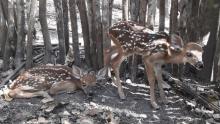Kej
Solapas principales
Señala el destacado lingüista k'iche' Sam Colop (1999: 27n12) que "el nominal kej, 'venado'" es "la forma antigua de kyej," como se escribe en la ortografía contemporánea k'iche'. Cabe notar que el padre Ximénez escribe la palabra en diferentes maneras a lo largo del texto: quieh y queh.
El erudito maya Allen J. Christenson (2007: 74n74) explica la relación entre kej/kyej y los otros animales que vigilan el bosque como tal: “Los K’iche’s creen que los animales salvajes del bosque sirven como guardianes y cuidadores para el dios de la tierra, a quien generalmente se le conoce como Juyub’-Taq’aj (Llanura de montaña) o Dios Mundo. A menudo se lo describe como un hombre viejo, amable y de pelo blanco que vive en los bosques deshabitados. Al cazar venados, beber de una corriente de montaña o limpiar un campo para plantar cultivos, primero se debe obtener permiso del dios de la tierra y un pago apropiado hecho en la forma de oraciones y ofrendas. Si las ofrendas apropiadas no son hechas, el dios de la tierra podría enviar uno de sus animales salvajes para atacar a la persona ingrata o para invadir su propiedad.” El venado mencionado en las secuencias de comienzo del Popol Wuj y por lo largo del texto son, el cree, “Lo más probable es el venado de cola blanca (Odocoileus americana toltecus)” (p74n75).
The distinguished K’iche’ linguist Sam Colop (1999: 27n12) points out that the nominal kej, ‘deer’” is “the ancient form of kyej,” as is written in the contemporary K’iche’ orthography. It should be noted that Father Ximénez writes the word in different ways throughout the text: quieh and queh.
Mayanist scholar Allen J. Christenson (2007: 74n74) explains the relationship between kej/kyej and the other animals who guard the forest as such: "Quichés believe that the wild animals of the forest serve as guardians and caretakers for the god of the earth, who is usually referred to as Juyub'-Taq'aj (Mountain-Plain) or Dios Mundo (Spanish for “God Earth). He is often described as a kindly, old, white-haired man who lives in the uninhabited forests. When hunting deer, drinking from a mountain stream, or clearing a field for planting crops, permission must first be obtained from the earth god and appropriate payment made in the form of prayers and offerings. If the proper offerings are not made, the earth god might send one of his wild animals to attack the ungrateful person or to raid his property." The deer mentioned in the opening sequences of the Popol Wuj and throughout the text are, he believes, "Most likely the white-tailed deer (Odocoileus americana toltecus)" (p74n75).
Image credit: Leslie García (2020), guatemala.com.
